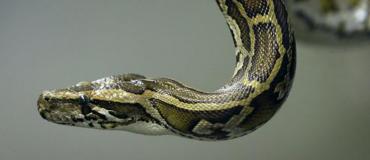
While the Florida Legislature talks about blowing billions of dollars on land in the Everglades, the reptilian elephant in the room continues to prosper, undeterred in those same Everglades.
The Burmese python. Going nowhere, going everywhere.
Barely a blip on anybody's radar outside the worried world of wildlife agency officials.
But now agencies of all kind confirm these creatures are headed into the high-rent district, causing more than one lifted eyebrow in posh neighborhoods in the Florida Keys.

In case you didn't hear, federal wildlife officers found pythons living in one of their own refuges in the Keys.
Four of these monster slithering eating machines, including a 16-foot female, were found at an old missile base in the 6,500-acre Crocodile National Wildlife Refuge. Scientists think the snakes migrated from the Everglades, where an estimated 100,000 of the alien animals have established, according to the U. S. Fish and Wildlife Service.
Bad news for wildlife if the pythons move farther south into the chain of islands. Several Keys species are said to be defenseless against them.
Compounding concerns: This past summer hatchling pythons were discovered near Key Largo -- a strong indication the snakes have found a welcome habitat and are multiplying.
"You think you've got people complaining about Lake Okeechobee discharges now, wait until we start watching our precious birds and key deer and marsh rabbits disappear," Maity Johnson, a retired real estate agent who winters in Islamorada, told Sunshine State News. "We just knew these pythons were going to invade us sooner or later."
The Florida Fish and Wildlife Conservation Commission (FWC) has heard Johnson and residents like her loud and clear. FWC is working with the University of Florida to detect and remove the snakes in the Keys. The Commission is partnering with the Irulas, members of a tribal community from India renowned for its ability to catch snakes. Have a look at the video on this page.
Masi Sadaiyan and Vadivel Gopal, members of the once-nomadic Irula tribe, have been living in the home of Joe Wasilewski. Their two months of work is funded by the FWC.
Wearing fleece jackets and baseball caps and armed with crowbars and machetes, they slash and wade their way through the largest subtropical wilderness in the world to hunt down Burmese pythons. This is a life they've lived all over the world -- and not just in search of pythons.
Back home, the men are part of a thriving 35-year-old co-operative of community members, who catch snakes and extract and sell their venom for a living. India is home to 50 species of venomous snakes and bites kill some 46,000 people a year, accounting for nearly half the snakebite deaths in the world.
The latest pythons turned up in a couple of old bunkers where the U.S. military once had a Nike Hercules missile firing range. The site was closed 30 years ago. Searchers using trackers and specially trained dogs sniffed out the snakes, said Crocodile Lake manager Jeremy Dixon.
“Snakes like deep, dark places,” he said. They also like black rats, which likely attracted them to the site, Dixon reckoned. The area also is home to hundreds of feral cats, another potential food source.
Burmese pythons will eat about anything. Dixon said the easy availability of food means the pythons could thrive on the Keys just as easily as they have multiplied in the Everglades. For more than two decades, all kinds of big snakes have spread and bred in the Everglades, but pythons by far have had the most devastating effect on native birds, deer and other species in the park. Some have even devoured alligators.
FWC and the University of Florida hope the two Indians can help put together and train a team of American snake catchers to work full-time eradicating pythons, especially the ones invading the Florida Keys.
This is just another reminder. Florida environmental problems abound.
It's easy -- while a focus remains on emptying the Amendment 1 account on a questionable land buy -- to overlook other ecological disasters on our fragile peninsula.
Thank God our wildlife officials get it. It just seems sad to me that they should have to soldier on virtually alone, scantly funded in all kinds of exotic removal endeavors, while our Daddy Warbucks Senate buys into a plan to add 60,000 reservoir acres to the 31,000 the state already owns and could adapt for deep-well injection. I'm not suggesting we spend billions on python eradication instead. I'm just pointing out the stark contrast between problems in the Florida environment and our propensity for concentrating so much, so desperately, so questionably, on one.
Reach Nancy Smith at nsmith@sunshinestatenews.com or at 228-282-2423. Twitter: @NancyLBSmith


